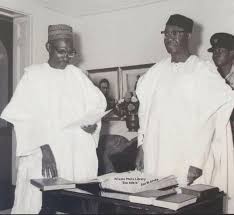
Introduction
The evolution of the Nigerian state is indeed a remarkable one, marked by numerous transformations, struggles, and eventual triumphs. The story of Nigeria is a dynamic one, reflecting the challenges of building a nation out of over 250 ethnic groups and overcoming periods of civil war, military rule, and political instability.
Pre-Independence Era
The area now known as Nigeria has a rich history dating back millennia, with sophisticated civilizations like the Nok culture (500 BCE – 200 CE) and powerful kingdoms such as Benin, Oyo, and the Sokoto Caliphate. In the 19th century, British influence in the area grew substantially. The Royal Niger Company chartered in 1886, played a crucial role in extending British control. By 1903, the British had established the Protectorates of Northern and Southern Nigeria, which were amalgamated in 1914 to form the colony of Nigeria. This move created the borders of modern-day Nigeria but also sowed seeds of tension due to the forced union of diverse ethnic groups under one colonial administration.

The Path to Independence
As the 20th century progressed, Nigerian nationalism gained momentum. Key figures emerged, including Nnamdi Azikiwe, leader of the National Council of Nigeria and the Cameroons (NCNC), Obafemi Awolowo, leader of the Action Group and Ahmadu Bello, who formed the Northern People’s Congress (NPC).
These leaders, along with others, campaigned for self-governance. Their efforts, combined with global shifts following World War II, led to gradual concessions from the British. Regional self-governance was introduced in 1957, paving the way for full independence.
Independence and Early Challenges
On October 1, 1960, Nigeria gained independence from British rule. The country adopted a federal system of government to manage its ethnic and regional diversity. Abubakar Tafawa Balewa became the first Prime Minister, leading a coalition government, while Nnamdi Azikiwe served as Governor-General, representing the British monarch who remained head of state. However, the young nation soon faced significant challenges such as Ethnic Tensions as a result of the division of the country into three regions each dominated by a major ethnic group (Hausa-Fulani, Yoruba, and Igbo), struggling to balance competing interests.
- Political Instability: Controversies surrounding the 1962-63 census and allegations of corruption in the 1964 federal elections heightened tensions.
- Military Intervention: On January 15, 1966, a group of military officers staged Nigeria’s first coup, killing Prime Minister Balewa and other leaders. This event marked the beginning of a turbulent period of military rule.
Civil War and Its Aftermath
Ethnic tensions and political instability culminated in the Nigerian Civil War (1967-1970). On May 30, 1967, Lieutenant Colonel Odumegwu Ojukwu declared the independence of the Eastern Region as the Republic of Biafra. The ensuing conflict resulted in significant loss of life and hindered national development.
The war’s end in 1970 ushered in a period of reconciliation under the slogan “No Victor, No Vanquished.” However, military rule persisted, with brief intervals of civilian governance.
Military Rule (1966-1999)
The period of military rule in Nigeria was characterized by political instability, economic fluctuations, and suppression of civil liberties. Key events during this era include:
- Multiple Coups: Nigeria experienced several military coups, including those in 1966, 1975, 1983, and 1985.
- Oil Boom and Economic Volatility: The discovery of oil in the 1970s led to an economic boom, but also increased dependency on oil exports, making the economy vulnerable to price fluctuations.
- Structural Adjustment Program: In the 1980s, Nigeria implemented economic reforms under the Structural Adjustment Program, with mixed results.
- Human Rights Concerns: Military regimes, particularly under General Sani Abacha (1993-1998), were marked by human rights abuses and suppression of political opposition.
- Annulled Election of 1993: The military government’s annulment of the June 12, 1993, presidential election, widely believed to have been won by M.K.O. Abiola, sparked widespread protests and international condemnation.
Transition to Democracy
The death of General Sani Abacha in 1998 opened the way for a return to civilian rule. Key steps in this transition included the 1999 Constitution. The military government of General Abdulsalami Abubakar oversaw the drafting of a new constitution, and democratic elections were held, leading to the emergence of Olusegun Obasanjo, a former military ruler, as the first president of Nigeria’s Fourth Republic.
The Fourth Republic (1999-Present)

Since the return to civilian rule, Nigeria has faced both opportunities and challenges:
- Political Developments
Democratic Consolidation: Nigeria has experienced its longest period of uninterrupted civilian rule, with regular elections and peaceful power transfers.
Governance Challenges: Issues of corruption, electoral malpractices, and regional tensions continue to pose challenges to democratic governance.
- Economic Growth and Diversification
Economic Rebasing: In 2014, Nigeria rebased its GDP calculations, revealing an economy 60% larger than previously estimated and becoming Africa’s largest economy.
Diversification Efforts: While oil remains a crucial sector, there have been efforts to diversify the economy, with growth in sectors such as telecommunications, finance, and entertainment.
Persistent Challenges: Despite economic growth, Nigeria continues to grapple with high poverty rates, unemployment, and income inequality.
- Social and Security Issues
Boko Haram Insurgency: The rise of the Boko Haram terrorist group in the northeast has posed significant security challenges since 2009.
Niger Delta Conflict: Tensions in the oil-rich Niger Delta region have periodically flared into violence, impacting oil production and environmental conditions.
Demographic Pressures: Rapid population growth has strained infrastructure and social services.
Looking to the Future
As Nigeria commemorates its 64th year of independence, the nation stands at a crossroads. Its large, youthful population and abundant natural resources offer immense potential for growth and development. However, realizing this potential requires addressing several key challenges:
Strengthening democratic institutions and combating corruption, diversifying the economy and reducing dependence on oil exports, improving infrastructure and social services, addressing security concerns and promoting national unity, and harnessing the potential of its youth through education and job creation.
Nigeria’s journey since independence has been marked by both triumphs and setbacks. As Africa’s most populous nation and a key player in the continent’s affairs, Nigeria’s future trajectory will have significant implications not only for its citizens but for the region and the world at large, however, the resilience demonstrated throughout its history gives hope that, with sound policies and inclusive governance, the country can overcome its current challenges and fulfill its immense potential.
